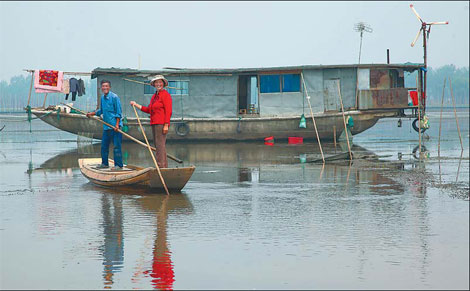|
|

Two people on board their fishing boats in Honghu Lake, in Central China's Hubei province. The lake, China's seventh largest, is home to 494 kinds of plants and 774 species of animal. Hasty development around the Lake, which was once blessed with plenty of wetland and was renowned as "the home of fish and rice", has left its ecology in a fragile condition. Provided to China Daily
|
Lender donates $16m to help restore wetland areas in China
Zhang Shengyuan cruises on Honghu Lake in Hubei province, keeping an eye on the birds and their eggs.
The 54-year-old is not a conventional ornithologist. Instead, he used to catch birds for a living, like many local fishermen, until a climate change program started in 2007 in the area. However, Zhang has put down his hunting guns and become a bird protector under the program conducted by the World Wildlife Fund and sponsored by HSBC Holdings Plc.
The lake, China's seventh largest, is home to 494 kinds of plants and 774 species of animal. Hasty development around Honghu Lake, which was once blessed with plenty of wetland and was renowned as "the home of fish and rice", has left its ecology in a fragile condition. The quality of the water was degraded, the birds began to fly away and fish died.
"After five years of effort, things are getting much better but it will still take a long time for the water to fully recover to what it used to be," said Zhang.
What's happening in Honghu reflects the general situation of wetland protection in China, said Lei Jinyu, project coordinator with the Wuhan project office of WWF China.
"There are achievements and more effort to be made," said Lei.
HSBC Water Programme, a $100 million five-year partnership between WWF, WaterAid and Earthwatch, was launched in June. It will continue to help the water and its communities in Honghu. Under the framework of the program, people will work to tackle risks to water resources, make them safe, improve sanitation for more than a million people and raise awareness about the challenge globally.
In China, the HSBC Water Programme will cover the Yangtze River, one of the most significant water courses in the world. The GDP of areas along the Yangtze River accounted for 2.9 percent of the world's total in 2010. It is expected to grow to 7.8 percent by 2050, according to a report released by Frontier Economics, a leading international consultancy. Some 100 million yuan ($16 million) of the $100 million global program will be devoted to management of water resources in China.
If the Yangtze River fails to offer a sustainable water supply to people living within the regions through which it passes, communities and enterprises may face a tough challenge to survive, a development that will damage economic growth in China, according to Lei Gang, director of freshwater projects for the WWF.
Over the next five years, WWF will cooperate with various levels of governments, research institutes, enterprises and local communities to manage 300,000 hectares of wetland to protect 600 finless porpoises and 800,000 water birds and to achieve 20 percent growth in the number of fish in the Yangtze River. As many as 115 enterprises and 120,000 people will participate and benefit from the program.
Chris Davies, deputy chief executive officer of HSBC China, said he is exited about getting involved in the stewardship of water-resource protection.
Davies said working for good causes involves responsibilities beyond just money. He was referring to the hard effort and time needed.
HSBC does not expect a return in the form of a short-term profit. Instead, it believes that if economic growth is sustainable, economic activity will be healthy and will benefit the banking industry in the long run, said Davies.
In Shanghai, a pioneering project aimed at promoting the water quality of Dalian Lake, in Qingpu district, has proved to be a success after intense management under the efforts of the WWF and local governments. Qingpu water authorities said in 2010 that the water in Dalian Lake had improved so much in quality that it could be used as a source for drinking water.
The Yangtze River plays a critical role in the economic growth of China. HSBC hopes that more enterprises will engage in pushing forward sustainable development of the region, said Helen Wong, CEO of HSBC China.
There will be more work managing water resources and wetlands in China over the next decades, said Yan Chenggao, deputy head of wetland authorities at the National Bureau of Forestry.
It takes the engagement of non-governmental organizations and enterprises and governments at various levels working together to improve wetlands, as well as the passing of laws and a long-term compensation scheme for those whose livelihoods are affected, said Yan.
Contact the writer at wuyiyao@chinadaily.com.cn.
|